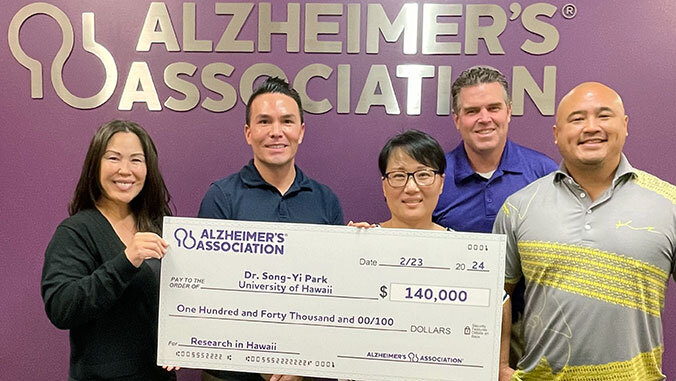
A researcher at the University of Hawaiʻi Cancer Center is using data from the Multiethnic Cohort (MEC) Study to study a recently recommended blood test for Alzheimer’s disease diagnosis as part of a $140,000 grant from the Alzheimer’s Association.
“The Multiethnic Cohort provides unique opportunities to better understand common diseases by comparing several racial/ethnic populations,” said Song-Yi Park, an associate professor at the UH Cancer Center. “Minority populations have been underrepresented in Alzheimer’s research, and we hope that this coveted research grant from the Alzheimer’s Association will reduce the research gap and help understand the performance of the safe and affordable blood test for Alzheimer’s detection among racial and ethnic minority individuals.”
Related UH News story: Dementia risk factors differ among ethnicitiess
The research focuses on evaluating the effectiveness of the blood test pTau-217, a specific blood biomarker for Alzheimer’s disease, in detecting Alzheimer’s among Native Hawaiian, African American and White populations in the MEC. The study aims to identify any racial or ethnic differences in pTau-217 levels and the factors that drive such differences, providing crucial insights into the early detection and confirmation of Alzheimer’s disease in dementia patients.
Park and UH Cancer Center researcher Unhee Lim previously reported for the first time that Alzheimer’s risk in Native Hawaiians is as high as in African Americans, with almost double the risk seen in Japanese Americans and also higher risks than in Latinos and Whites. The study showed significant racial/ethnic disparities in Alzheimer’s disease and related dementias.
Park has also conducted multiple studies on the incidence and survival of cancer in the MEC. She identified the patterns and risk factors prevalent across the five racial and ethnic populations in the cohort.
“Funding Dr. Park not only supports this critical project but is part of a broader Alzheimerʻs Association effort to keep the best and brightest scientists working on this disease,” said LJ Duenas, the executive director of the Alzheimer’s Association.
To learn more about what the Alzheimer’s Association is doing to improving Alzheimer’s care, support and research, go to alz.org.

